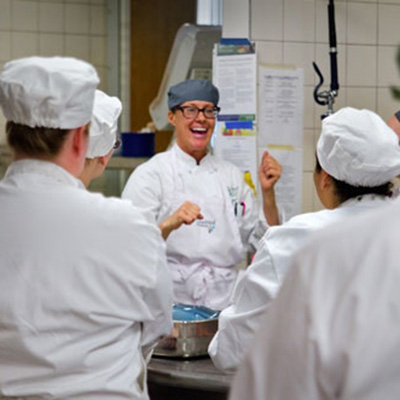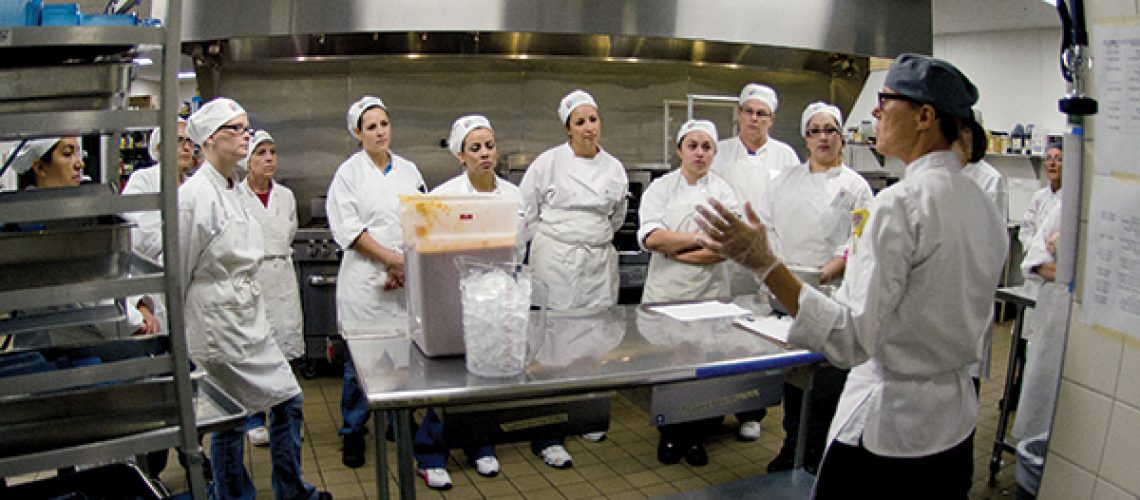LiveWell’s School Food Initiative (SFI) partners with Food & Nutrition Service Departments to serve up freshly prepared meals to students across the state. The Initiative began in 2010 and has continued to grow and evolve into an impactful program reaching well over half of Colorado’s 178 school districts. Gabriella Warner, MS, RD, joined LiveWell as the SFI Program Director in May of 2015. She and her dynamic team of specialists are dedicated to supporting school districts serve fresh, wholesome, and nourishing food to their students. We sat down with Gabriella to reflect on this important work over the past year and the outlook for the year ahead.
What were some of the School Food Initiative’s biggest accomplishments in 2016?
I’m really proud of the new districts that began working with us in August at our freshly restructured Introductory Workshop. This cohort consists of eight school districts: Thompson R2-J, Englewood 1, East Grand 2, Fort Morgan, Moffat 2, Idalia RJ-3, Centennial RE-1, and Ouray R-1. We’ve been working with them for several months now, and we look forward to helping them meet their goals in 2017 – some of which include the incorporation of new and innovative recipes that use fresh ingredients on a more consistent basis, as well as community-driven promotion of school food. I’m also excited about operationalizing the logistical changes that we’ve made to improve SFI’s overall structure and programmatic effectiveness.
Additionally, our revitalized partnership with the Colorado Department of Education (CDE) served as a remarkable point of evolution for the SFI and our offerings. This summer, we partook in the implementation of the CDE’s Fundamentals of Menu Planning series. This unique collaboration between the CDE’s Office of School Nutrition and LiveWell’s SFI brought scratch cooking to life in a “new and improved” menu planning training. This was one of three joint trainings that took place across the state to help school districts improve their healthy food offerings while remaining compliant with state and federal regulations. Another CDE partnership opportunity came from serving as panelists for the CDE’s Team Up for School Nutrition training, where we advocated for increasing participation in the National School Lunch Program, as well as in summer meals.
 What are some of the biggest changes you’ve made to the program since coming on as director?
What are some of the biggest changes you’ve made to the program since coming on as director?
One of the biggest changes we made was extending the timeline that we spend working with each cohort of school districts to 18 months, as well as moving the introductory workshop from March to August. This schedule not only better aligns with the school year and commodity ordering, but it gives this difficult work the time and energy it deserves. We also changed the metrics for how LiveWell’s chef consultants deliver services to districts, which has allowed our team of chef consultants to maximize their direct training and hands-on support to the districts. Additionally, the expanded partnerships mentioned above opened many new doors for us that will continue to advance the program. For example, we presented at the Colorado School Nutrition Association’s annual conference this year! Our skillful (and highly entertaining) chef consultants showcased the proper and safe usage of specialized equipment for in-house processing of fresh produce in a live demo, aptly named Kitchen Hacks; Get it, Use it.
As we look ahead to 2017, what is your overall outlook for this program, and school food work in general?
Like many others, I’m eager to see what happens with the new presidential administration when it comes to federal school food policies. I’m hopeful that the nutrition standards established via the Healthy Hunger Free Kids Act (HHFKA) will remain in place so we can continue providing healthy food for those who need it most. But regardless of the political landscape, LiveWell’s School Food Initiative will remain steadfast in our work to deliver on the intention of HHFKA– which is to improve the quality and nutrition of the food served in the school environment. After all, food is a most powerful medicine, and we have an obligation to make sure children aren’t living off what author Michael Pollan calls “food-like substances” but instead thriving off of real, quality food from the ground that gives them a platform to flourish in school and beyond.


